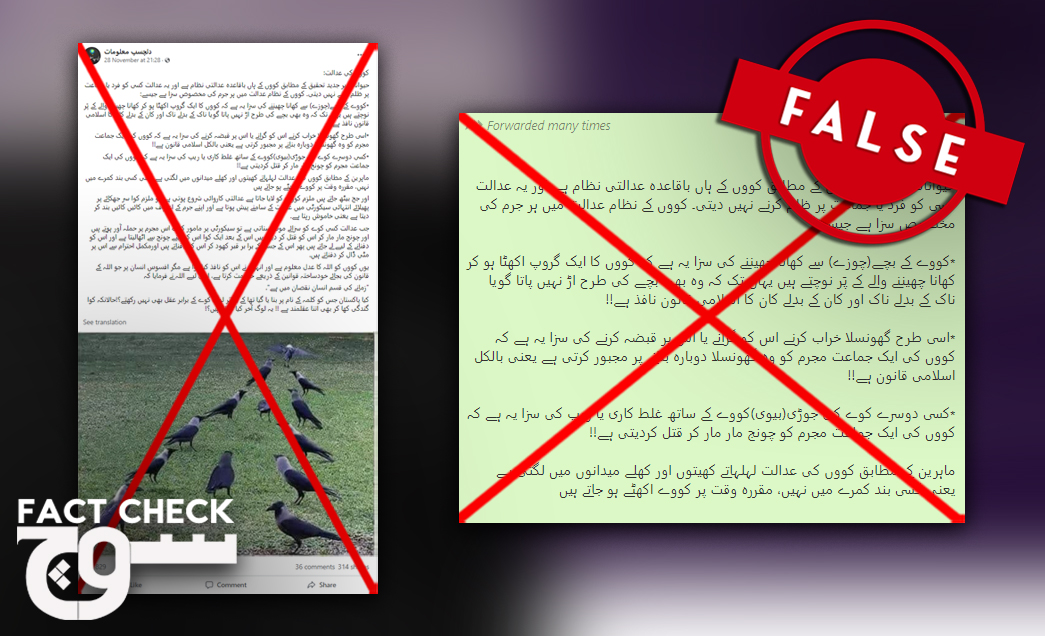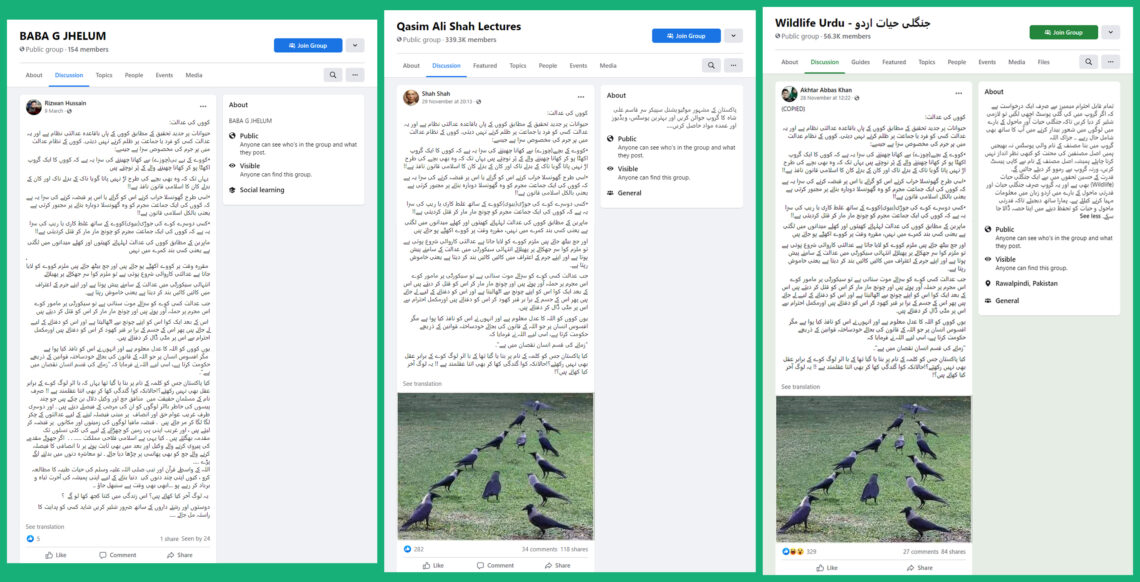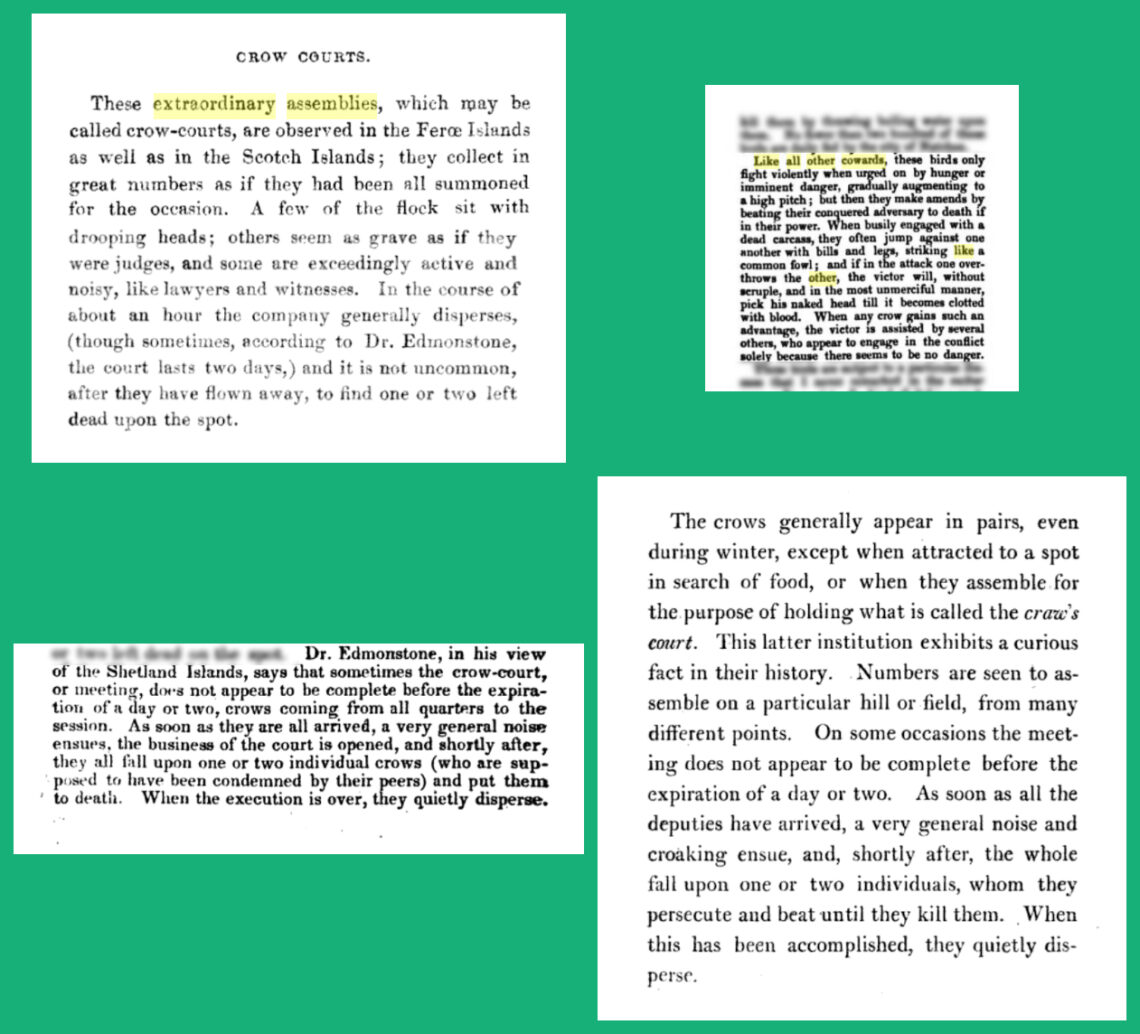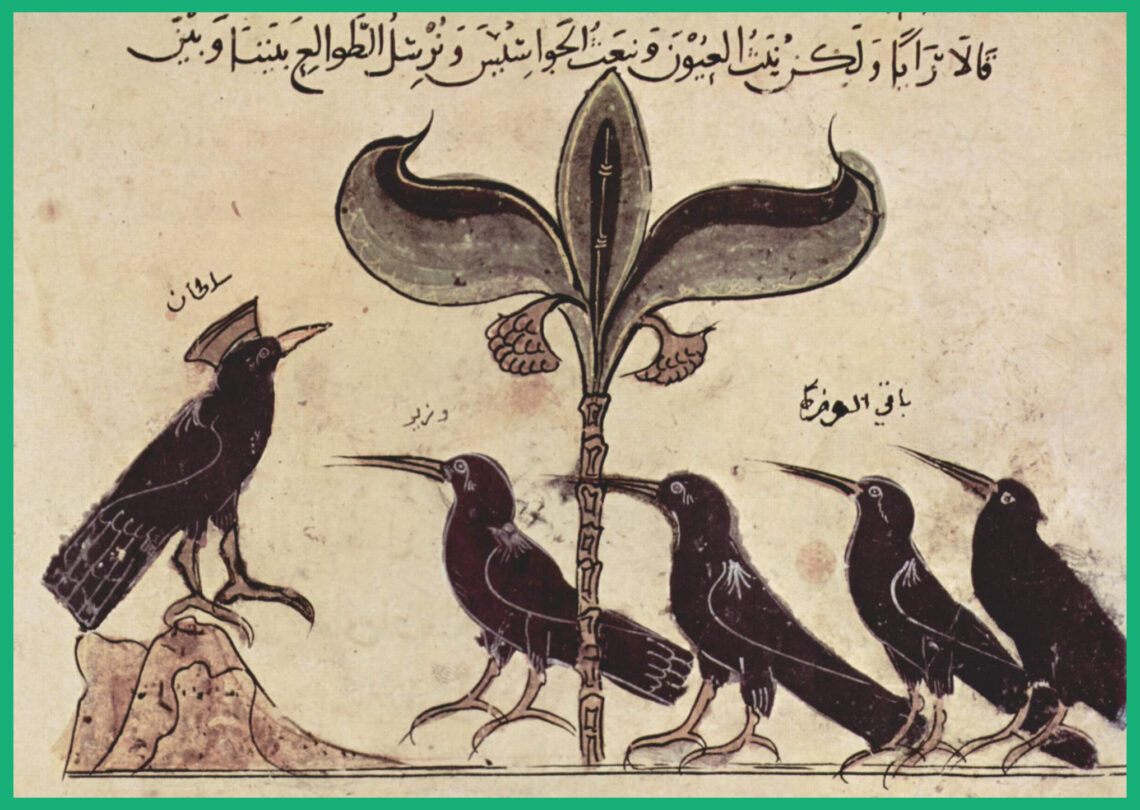
Claim: Modern zoological research suggests that crows have a proper court system with specific punishments for particular crimes. The court system protects individuals and/or groups from oppression. The claims compare the so-called courts of the crows to Shariah, or Islamic law.
Fact: Animals do not hold court or cast sentences, according to avian ethologist Dr Kaeli Swift PhD who studies corvidae behaviour. Second, crows do sometimes kill one another, but they do not arrive at such actions via any kind of court system. Competition breeds conflict and sometimes conflicts are settled violently on the spot.
On 10 December 2021, Soch Fact Check received a forwarded chain message on WhatsApp stating that crows have a proper court system with specific punishments for particular crimes and that said judicial setup is similar to that of Shariah (Islamic) law.

Translated into English, the message reads as follows:
“The Court of the Crows
According to modern research on animals, crows have a regular court system and this court does not allow anyone to oppress an individual or a group. Crows have a specific punishment for each crime in the court system, such as:
- The punishment for snatching food from a baby (chick) is that a group of crows gather and pluck the criminal’s feathers until it cannot fly like a child and, thus, the Islamic law of ‘an eye for an eye and a tooth for a tooth’ is enforced!
- The punishment for destroying a nest, tearing it down or taking it over (encroaching) is a group of crows forcing the criminal to rebuild that nest, which is absolutely Islamic law!
- The punishment for raping another crow’s wife (female partner) is that a group of crows kills the culprit by stabbing it with their beaks!
According to experts, the court of the crows is held in swaying fields and open land, not in a closed room. At the appointed time, the crows gather and the judges sit down. The crow, with its head down, appears before the court under tight security, and stays silent as a confession of its guilt.
When a crow is sentenced to death by a court, the security guards attack the culprit and kill it with their beaks. Subsequently, a single crow picks it up with its beak and takes it away for burial. They then dig a grave the size of its body and, with utmost respect, bury it by covering it with dirt.
Thus, the crows know the justice of Allah and they enforce it, but woe to the man who rules by self-made laws instead of the law of Allah. That’s why Allah says: “Indeed, humanity is in ‘grave’ loss.”
Are the influential people of Pakistan, a country that was created in the name of Kalimah [First Tradition of Islam], not even as intelligent as a crow? Despite eating dirt, the crow is so wise! What do these people eat?”

Another version includes an additional paragraph, which explains in detail how land mafias operate, lawyers and judges in Pakistan rule in favour of influential individuals, and how people greedily accumulate wealth. It ends by advising readers to follow religion and be wary of the afterlife, as well as an instruction to share the message widely.
Soch Fact Check conducted a CrowdTangle analysis for posts on Facebook using the following three search terms for the 30-day period leading up to 14 December 2021.
- “کیا پاکستان جس کو کلمہ کے نام پر بنا یا گیا تھا کے با اثر لوگ کوے کے برابر عقل بھی نہیں رکھتے”
- “کووں کی عدالت”
The first search term received 3,662 interactions across 51 posts, while the second received 3,975 interactions across 52 posts. Moreover, the posts pertaining to the second search term, as well as the reactions to them, peaked in frequency between November 28 and December 4, 2021.
A post from a Facebook page called ‘دلچسپ معلومات’ received more than 800 reactions and upwards of 300 shares, while two others — in the groups ‘جنگلی حیات اردو – Wildlife Urdu’ and ‘Qasim Ali Shah Lectures’ — attracted 329 reactions and 84 shares and 282 reactions and 118 shares, respectively.
Soch Fact Check also searched for the third term — “کووں کی عدالت [The court of the crows]” — for Facebook posts since 2011 and found that there were more than 200 posts with close to 12,000 interactions. Further, posts relating to this search term peaked in frequency thrice: on 5 January 2020, 8 March 2021, and 29 November 2021.
It appears that the oldest post was made on 7 August 2016. To date, this post has gained the most momentum with 828 reactions and 316 shares, this post has received the highest number of comments, and this post has performed 15 times better than others.
Soch Fact Check went through four different books — The Young Naturalist’s Book of Birds by English journalist Percy Bolingbroke Saint John published in 1838, Goldsmith’s Natural History by Irish novelist Oliver Goldsmith published in 1923, The Young Man’s Evening Book by American publisher Charles S. Francis published in 1855, and A View of the Ancient and Present State of the Zetland Islands by Scottish writer Arthur Edmondston published in 1809 — as they mentioned “extraordinary assemblies” of crows but all these books had anecdotal accounts and were not backed up by any scientific facts or research.

(Clockwise, from top left): Selection portions on crows from The Young Naturalist’s Book of Birds: Anecdotes of the Feathered Creation by Percy Bolingbroke Saint John; Goldsmith’s Natural History, With Notes Collected, With A Life Of O. Goldsmith By G.m. Bussey, By H. Innes by Oliver Goldsmith; The Young Man’s Evening Book: Embracing Sketches and Anecdotes in Natural History, Incidents of Travel, Biographical Sketches, Poetical Selections, and Other Subjects Suited to Interest and Instruct the Mind by Charles S. Francis and Joseph H. Francis; and A View of the Ancient and Present State of the Zetland Islands: Including Their Civil, Political, and Natural History; Antiquities; and an Account of Their Agriculture, Fisheries, Commerce, and the State of Society and Manners, Volume 2 by Arthur Edmondston
Soch Fact Check then spoke to Dr Kaeli Swift — an avian ethologist who holds a PhD in avian ecology and animal ethology and studies corvidae, which include crows and ravens — and asked her about the claims made in the WhatsApp chain message.
“None of this is true or has any research to support it. It makes a nice allegory but of course animals don’t hold court and cast sentences,” Dr Swift said. “Crows do sometimes kill one another but they don’t arrive at such actions via court systems. Competition breeds conflict and sometimes conflicts are settled violently on the spot.”
In a comment on her blog, she further states, “I have never witnessed crows digging a grave and have not heard of others witnessing this either.” Gathering in a group around a dead crow most likely means that the birds are trying to ascertain if the place of death poses any danger to the rest, she told National Geographic.
Soch Fact Check also reached out to Professor John M. Marzluff, who has been studying corvidae behavior for over 35 years and teaches Wildlife Science at the University of Washington. In an email, Prof Marzluff said the claims being made in the WhatsApp chain message are “not true”.
“It is perhaps folklore, but not rooted in scientific fact. Crows defend their young and nests strongly and attack those who encroach, but this is typical for territorial animals, including us humans,” the professor added. This is in line with comments by Dr Swift, who underlines in the Frequently Asked Questions (FAQ) section of her blog that if these birds fight outside of their family, “they may be fighting to defend mates, food, or territory boundaries”.
“If a particular fight ends up deadly it might be because one of the participants was much weaker and just couldn’t take the assault, or misjudged something and got killed ‘accidentally’,” she says.
Scientific research does, however, suggest that corvidae — including crows and ravens — remember faces, especially those of the humans they deem dangerous even after a single interaction as they can differentiate between positive and negative emotions and possess complex brains. In fact, tests conducted by Prof Marzluff, who has taught Dr Swift as well, suggest that crows hold ‘funerals’ — where crows gather at the scene of the incident to assess potential danger, not to actually dig a grave — for their dead and scold anyone who does them wrong.
 It is worth noting that the idea that crows have courts is not new. Kalila wa-Dimna, a literary masterpiece, depicting a ‘King’ crow having discussions with his advisers was written in 1210. More recently, Timothy Hutchings, an artist and game designer, actually created a live action roleplay (LARP) game called ‘A Crow Funeral’ based on the idea of crow gatherings.
It is worth noting that the idea that crows have courts is not new. Kalila wa-Dimna, a literary masterpiece, depicting a ‘King’ crow having discussions with his advisers was written in 1210. More recently, Timothy Hutchings, an artist and game designer, actually created a live action roleplay (LARP) game called ‘A Crow Funeral’ based on the idea of crow gatherings.
Conclusion: Regardless of how fascinating crows are, these birds do not have crow courts, crow parliaments, or a crow code. Crows do not have a justice system; however, crows may attack each other when one crow trespasses on another’s territory or harms a younger crow. Other animals do the same.
